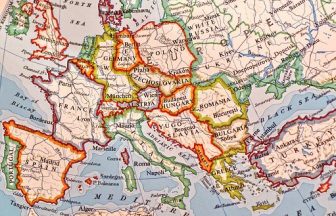「detour」は「離れて回る」→「向きを変えて立ち去る」⇒「回り道をする、迂回する」
de「離れる」+ tour「回る」→「離れて回る」→「向きを変えて立ち去る」⇒「回り道をする、迂回する」
detour 動詞「回り道をする、迂回する」
detour 名詞「遠回り、回り道、う回路」
He makes a detour to avoid the traffic jam every day.
「彼は毎日交通渋滞を避けるため遠回りをしている」
The bus driver made a wide detour of the mountain road, choosing a road where there was no danger of landslides.
「バスの運転手は山道を大きく迂回して、土砂崩れの危険のない道を選んだ」
「attorney」は「~に回された人」→「~に仕事を委ねられた人」⇒「弁護士、法廷代理人」
at「~の方へ」+ torn「回る」+ ey「される人」→「~へ回された人」→「~に仕事を委ねられた人」⇒「弁護士、法廷代理人」
attorney「弁護士、法廷代理人」
That sort of negotiation is best with an attorney to serve as go-between.
「そういう交渉は弁護士を間に挟んだ方がよい」
「contour」は「ぐるぐる回る」⇒「輪郭線、外形、体の線」
con「(強意)」+ tour「回る」→「ぐるぐる回る」⇒「輪郭線、外形、体の線」
contour「輪郭線、外形、体の線」
When I put the carving in the light, the contours stood out more sharply.
「ライトを当てるとその彫刻の輪郭がよりくっきりと浮き出た」
「returnee」は「戻されたひと」⇒「強制送還者、帰還者、帰国者、帰国子女」
re「再び」+ turn「回る」+ ee「~される人」→「戻された人」⇒「強制送還者、帰還者、帰国者、帰国子女」
returnee「強制送還者、帰還者、帰国者、帰国子女」
So he’s a returnee. Then he ought to be good at English.
「彼は帰国子女だったのか。さてこそ英語がうまいはずだ」
















